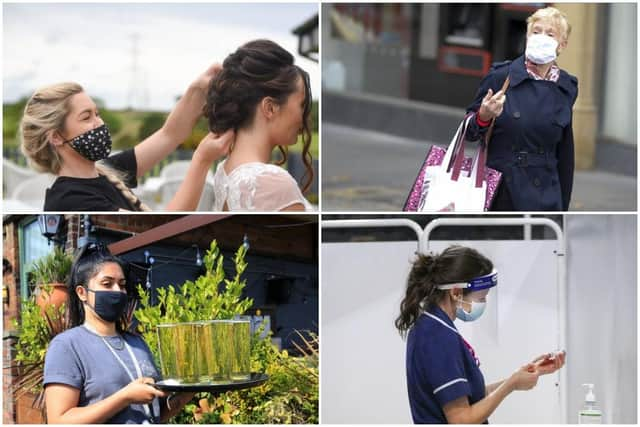Here is everything you can and can't do from today as rules are tweaked following "Freedom Day" delay
and live on Freeview channel 276
Today was supposed to be the point at which all remaining Covid-19 restrictions were lifted, and was dubbed “freedom day”.
Prime Minister Boris Johnson confirmed earlier this month that there would have to be a four-week delay due to a rise in the Delta variant.
Advertisement
Hide AdAdvertisement
Hide AdThere are now hopes this date could be brought forward from July 19 to July 5, following the news that more than one million Covid-19 jabs were booked in just two days after the NHS vaccination programme was opened to all remaining adults in England.


As we wait to hear what will happen next, a number of minor rule changes have come in force today affecting weddings, care homes and wakes.
This list takes you through everything we can and can’t do during what we hope will be the final stretch of the third national lockdown.
Care homes:
From today (Monday, June 21) it is now possible for care home residents to stay overnight at the homes of friends and family.
Advertisement
Hide AdAdvertisement
Hide AdA spokesman for Prime Minister Boris Johnson said residents will not need to quarantine for a fortnight on their return “in most cases.”
Residents will not be required to isolate when they move to a care home, and will have a series of tests over their first fortnight at their new residence instead.
Face coverings:
Pupils are not required to wear face coverings at school, although this does vary across local authority areas.
Members of the public without an exemption are still required to wear face coverings in public spaces and on public transport.
Hospitality:
Advertisement
Hide AdAdvertisement
Hide AdThe existing limits of groups of six, or two households, being permitted to meet indoors will continue to apply at bars, pubs and restaurants.
Venues are still required to provide table service, and customers must wear face coverings when you are not sat down.
Nightclubs:
Following the delay to “freedom day” nightclubs must remain closed until all restrictions are lifted. Last week, the owner of Sheffield’s Tank nightclub, on Arundel Gate, in the city centre, said they were left ‘angry’, ‘confused’ and ‘heartbroken’ by the delay, but vowed ‘we will rave again very soon’.
Social gatherings:
It is still possible to meet up to 29 people outdoors, following the change that came into force with Stage 3 on May 17, permitting groups of 30 to gather in outdoor settings.
Advertisement
Hide AdAdvertisement
Hide AdSocial distancing guidance still applies, and people are invited to use their own judgement.
Sporting events:
The limit on audience numbers for sporting events remain the same, with 25 per cent capacity at outdoor stadiums, up to a maximum of 10,000 fans.
Special dispensation has been made for high profile tournaments including the final of Euro 2020 on July 11, when 45,000 fans will be admitted to Wembley Stadium.
Similarly, the the men’s and women’s finals at Wimbledon will take place on July 11 and 10, respectively, in front of a full house.
Theatres:
Advertisement
Hide AdAdvertisement
Hide AdThe country’s theatres will continue to operate with social distancing guidelines in place.
Vaccinations:
Over-18s are currently being invited for their first jab, as the UK-wide rollout of the Covid-19 vaccination programme continues.
Saturday saw the second consecutive Covid vaccination drop-in session at the Crucible Theatre, where over 18s who have not yet had their first vaccination have been invited to queue up for a Pfizer vaccination. Sheffield CCG said there will be “several” rolling clinics over the next few weeks in a statement released on June 10.
In addition, the Government has pledged to “double jab” two thirds of the adult population by July 19, and to accelerate the second vaccination for the over-40s.
Advertisement
Hide AdAdvertisement
Hide AdSpeaking at a press conference last week, Prime Minister Boris Johnson said: “By Monday 19th July we will aim to have double jabbed around two thirds of the adult population including everyone over 50, all the vulnerable, all the frontline health and care workers and everyone over 40 who received their first dose by mid-May. And to do this we will now accelerate the 2nd jabs for those over 40 – just as we did for the vulnerable groups – so they get maximum protection as fast as possible.”
Earlier today, Health Secretary Matt Hancock said he hopes to remove the requirement for double jabbed people to isolate for 10 days if they come into contact with someone who has Covid.
Wakes:
The limit of 30 people on commemorative events including funerals has now been lifted, and capacity will be driven by the maximum amount of people the venue can safely accommodate, while adhering to Covid rules.
As a consequence, wakes will be subject to the same rules as funerals.
Weddings:
Advertisement
Hide AdAdvertisement
Hide AdThe 30 people limit has also been lifted for funerals, again with capacity driven by the maximum amount of people the venue can safely accommodate, while adhering to Covid rules.
However a number of rules concerning what guests can and cannot do remain in place, including:
- Singing and dancing is still banned
- The dance floor must be closed off for everything except for the wedding couple’s first dance, which is permitted
- Marquees on private land need to have two open sides in order to be categorised as “outside”
- Guests are required to be seated on tables of no more than six people
Working from home:
Those who are able to are still advised to work from home.